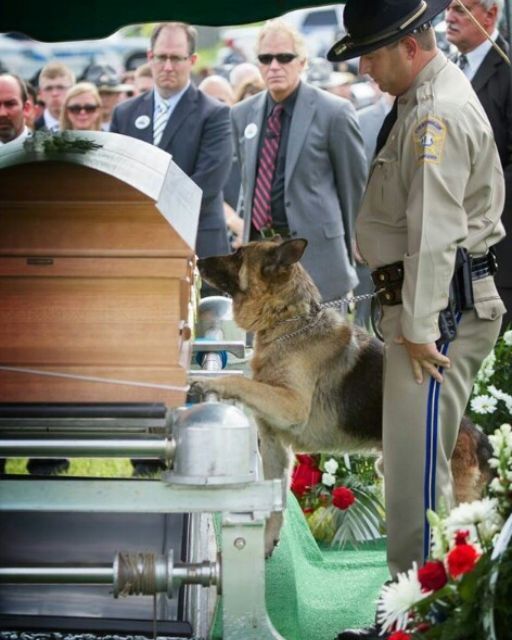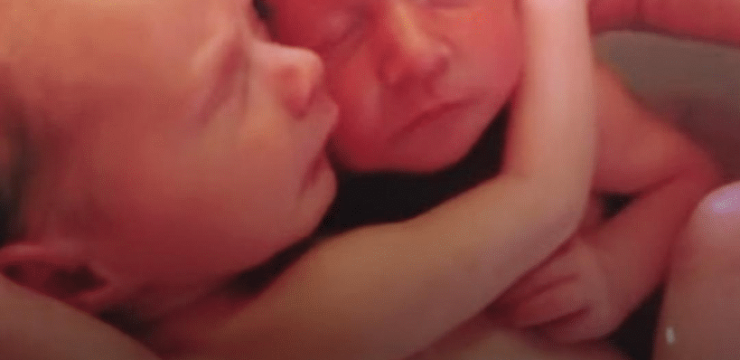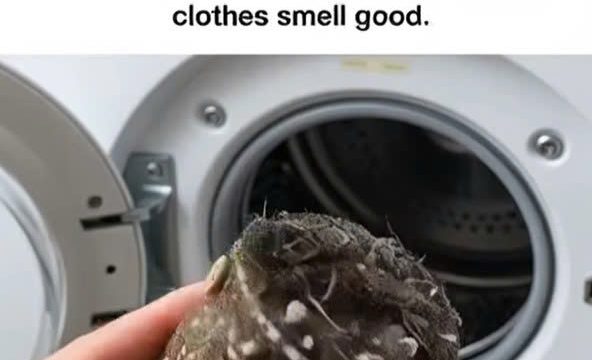They said the dog hadn’t eaten in four days, and for those four days, he did nothing but pace and whimper near the front door, refusing every comforting gesture, ignoring food, and waiting as if his purpose had not yet been fulfilled. Then on the morning of the funeral, they gently loaded him into the patrol car one last time, and without resistance, he climbed in as if he knew exactly where he needed to be.

The funeral service was somber and dignified, with officers standing in solemn rows, badges gleaming and flags crisply folded. I stood near the back, not part of the official circle, yet something kept me rooted there. I had watched Officer Silas and Valor, his K9 partner, work together time and again, moving in perfect rhythm like they shared a silent language. Everyone praised Valor’s elite training and discipline, but what I remembered most was his devotion—the intense way he watched Silas, as though the world itself didn’t matter until he gave a command.
Now, with his handler gone, Valor stood with his front paws gently resting on the casket, nose pressed against the wood. He didn’t bark or cry—he simply sniffed, slowly and methodically, like he was trying to understand something beyond his comprehension. His leash was taut, held tightly by a visibly shaken officer whose knuckles were white from the grip. Yet Valor remained fixed on the casket, as if the truth still lingered there. Something about that moment didn’t sit right with me. There were whispers that Silas hadn’t been on the schedule that night. The call that sent him out had mysteriously disappeared from the logs, and the final radio transmission was garbled and strangely unlike his usual tone. As Valor let out a sudden, sharp whine, I spotted something odd—a folded scrap of fabric sticking out from beneath the casket.
It wasn’t standard issue. The color was a darker shade of blue, the weave rougher, and it reeked of scorched metal and something else that instantly raised alarms. I wasn’t law enforcement, just a local journalist, but that scent—that fragment—felt like a clue. The days that followed became a blur of obsession. Everyone else seemed content to accept the narrative of a fallen officer and a tragic accident, but I couldn’t shake the feeling that something was being hidden. Valor certainly couldn’t.
At the precinct, he paced endlessly around Silas’s vacant desk. Officers tried to comfort him, but he was inconsolable. It was as if he knew there was more to the story. I started digging, and eventually, I got access to the department’s radio logs and incident reports. That’s when I discovered something chilling—the final call that sent Silas out was labeled a “phantom call.” No caller ID, no originating location, only a strange digital voice and coordinates pointing to an old warehouse known for shady dealings. No witnesses. No weapons recovered. Just silence and a thin layer of dust. I took the fabric to a local uniform supplier who confirmed it wasn’t from any police uniform. Instead, it was a custom material used by a private security company—one with deep ties to local officials. That discovery was the pivot. Silas hadn’t walked into an ambush by accident. He was sent there. Someone had covered their tracks, and too many people were willing to look the other way. I returned to the warehouse, and to my shock, found Valor there ahead of me, having escaped the precinct. He was sniffing around a dark corner, ears up, tail still. Following his lead, I found a false wall hiding a small room with a scorched laptop, a radio device, and partially burned documents. The smell of burnt wires was overwhelming. With help from a tech-savvy friend, I hacked the laptop and uncovered evidence that shook me to my core. Silas had discovered a conspiracy—corrupt officials and the private security firm were colluding in criminal activities. The call that led to his death had been forged using software to mimic his voice and send him into a trap. They thought they had deleted everything, but they underestimated one thing—Valor. The dog had picked up the faint scent of a rare wood polish, used only on a particular set of custom batons favored by the firm’s top executive. That scent led us to a hidden drawer in the firm’s office, where we found the missing logs, a backup of the original call, and a final recorded message from Silas himself. He knew he was being hunted. Armed with the truth, I handed over everything to the authorities. The investigation reopened. Arrests were made. And Valor, the dog who refused to accept a lie, became the hero no one expected. This story taught me that loyalty isn’t just powerful—it’s relentless. Sometimes, it takes the determination of someone who doesn’t speak our language to uncover what others try to bury. Never underestimate the nose of a dog, the pull of the truth, or the strength of your gut instinct. Keep asking questions. Keep pushing forward. Because even in the darkest corners, the truth has a scent—and someone out there will follow it.





